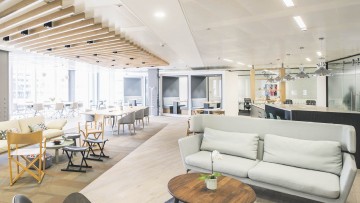Increasing demands for co-working spaces are providing the foundation for companies of the future to emerge and flourish. With modern working environments becoming a key decision-making tool for tomorrow’s talent pool, says flexible workspace provider Regus, businesses must adapt their thinking in order to attract and retain the best workers.
Flexibility is more than just a highly prized employee benefit. Increasingly, today’s workers expect employers to move beyond the outdated concept of the fixed hours, fixed location role so common to generations past. It is a jobseekers market and, when it comes to deciding how they work, more than anything top talent wants flexibility, opportunities to collaborate and an unconstrained working environment.
The latest workspaces accommodate the requirement for a range of different working styles within one area, meeting the variable needs of organisations and individuals
But there is more to the future of work than the way people do their jobs. More and more, it is about where and how they do it. A recent report from Regus reveals that 45 per cent of UK workers are now based outside their main office for more than half the week.
Of course, employers want to know that such a flexible approach can work. In fact, the evidence is compelling. Employees who are able to choose when they work, where they work and how they work are known to be more motivated, engaged and productive. Research commissioned by Regus last year confirms this point with 81 per cent of the senior business people polled indicating that flexible working improves business productivity.
Understandably, demand for flexible workspace is rising, and the working patterns of today’s workers are instrumental in shaping these spaces for today and beyond.
The latest workspaces accommodate the requirement for a range of different working styles within one area, meeting the variable needs of organisations and individuals. So meeting rooms are available for privacy and quiet, “hot desks” are available for drop-in workers on the move, and collaborative “co-working” spaces facilitate the sharing of ideas and contacts in a relaxed, yet professional, atmosphere.

“There has been much discussion about the flexible workspaces of the future,” says Richard Morris, Regus UK chief executive. “Increasingly, they are being shaped by the people who use them, by people who want to collaborate with like-minded individuals and enjoy the freedom to define their ‘work station’ as anywhere they decide to sit down.”
From within this more flexible style of working, the concept of co-working has emerged as one of the fastest-growing trends of recent years. Co-working describes shared-working environments, where professionals from a number of different organisations work alongside each other.
Collaboration with other like-minded workers is one of the big advantages of such an approach. Bouncing ideas off different teams and sharing concepts with developers from other businesses can be a powerful catalyst for innovation, creativity and, ultimately, productivity.
This becomes increasingly important as more and more organisations measure employee performance based on their output and productivity, rather than the number of hours they spend sitting at a desk.
There is also a compelling business case for using shared spaces. According to the 2015 GCUC/Emergent Research Co-working Survey, 84 per cent of workers said they were more engaged and motivated when co-working. Regus’s own research backs this up, with three fifths of respondents claiming co-working inspires entrepreneurial thinking (61 per cent) and innovation (60 per cent).

“Organisations are increasingly recognising the need to provide their staff with workspaces that accommodate their diverse expectations, encompassing their definition of what work is, where it takes place and when it should happen,” says Mr Morris. “Even though the origins of co-working lie with entrepreneurs and very small businesses, it has become increasingly relevant for much larger firms and traditional companies to incorporate the model of flexibility and co-working into their business strategy, creating the right kind of workspace to drive productivity and growth.”
As well as boosting productivity and creativity, flexible working can impact positively on an individual’s health. With employee wellbeing taking on increasing prominence on the corporate agenda, companies are becoming more aware of the role played by the work environment.
A flexible workspace that facilitates mindfulness, encourages interaction with different people every day, and allows employees to choose which part of the physical workspace will be their “desk” for the day, boosts a sense of satisfaction, motivation and overall wellbeing.
Indeed, when it comes to planning the space where their staff will work, employers need to listen to their employees. As a recent survey by the Royal Institute of Chartered Surveyors (RICS) revealed, almost half of UK employees don’t like their working environment. This has serious implications for companies striving to recruit and retain talent. If employees don’t have flexibility within their work location, there is a greater chance of them looking for it elsewhere. Four fifths of those surveyed by RICS said their workplace had a bearing on their decision to stay in their current job.
Mr Morris concludes: “Clearly the days of the fixed location, rigid hours job are numbered. The latest generation of employees has very different demands and expectations when it comes to the world of work. Already we are seeing the future of work is one where the workspace adapts to the worker – not the other way around. In terms of productivity, creativity and wellbeing, the benefits are clear, and workspace will evolve to provide the environment that supports all these things.”
Regus is the world’s largest provider of workspace, with a global network of 2,600 locations across 106 countries. Founded in Brussels, in 1989, the company is based in Luxembourg and listed on the London Stock Exchange. For more information please visit www.regus.co.uk


